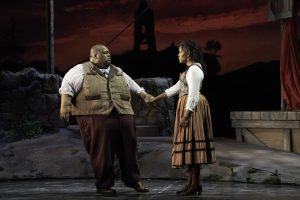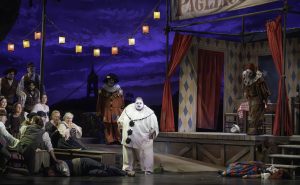
By Michelle F. Solomon
On Valentine’s Day in 1942, tenor and voice teacher Arturo di Filippi, co-founder of the Opera Guild of Greater Miami, the precursor to Florida Grand Opera, produced its first production. It was Ruggero Leoncavallo’s Pagliacci, and it played for only one night at Miami High School.
It was groundbreaking because only four years later, The Opera Guild Inc. of Fort Lauderdale was founded to bring Miami’s Opera Guild to perform at the city’s War Memorial.
And the history-making continues.
For its 82nd season, Florida Grand Opera (which was created in 1994 when the Miami and Fort Lauderdale guilds merged) revisited Pagliacci for the ninth time since that first production. But this Pagliacci (seen in Broward on Feb. 10) was like none other FGO had presented.
Pagliacci is an audience favorite partly because of its “play within a play” about a traveling commedia dell’arte troupe of actors that settles in for shows in a rural Italian village. During the course of its stay, a love triangle turns fatal, leaving the audience on stage wondering if the drama is part of the show or if a double murder is really happening before their eyes.
The strong leads of Canio and his beloved wife Nedda in FGO’s most recent production were played by two Black opera stars, Black singers are most often cast in stories centered around a specific culture — Porgy and Bess comes to mind — the roles of Canio and Nedda have usually performed by white opera singers.
The FGO casting didn’t bring anything more profound to Leoncavallo’s libretto than when it was first performed in 1892. For this production, it was obvious that the best tenor and soprano were cast with Limmie Pulliam as Canio and Kearstin Piper Brown as Nedda, both making their FGO debuts.
Pulliam, a tenor of immense talent, has been absent from the opera stage for more than a decade after dropping out in the early 2000s because of comments made by casting directors about his excessive weight. His Canio the clown was nuanced and complex, and, in some ways, Pulliam’s size brought another dimension to the drama as Nedda swooned for a more handsome, younger, and slimmer man in Silvio.
As Nedda, Brown’s singing was bright and clear, with a lovely aria early in the show, but her chemistry with Silvio (baritone Eleomar Cuello) wasn’t elevated enough to make it believable that she longed to run away with her young lover later in the first act. Cuello’s baritone was richly colored in the pair’s long and melodic duet where the two tell of their love for each other, but he, too, lacked the believability of wanting to steal away with the actress.
Robert Mellon stole the spotlight from the beginning as the lecherous and conniving Tonio. Director Jeffrey Marc Buchman brought him closer to the audience, off the stage near the first rows of seats, stage left, for the Prologue. It made the foreshadowing of his message (he says he has been sent by the author) more menacing. “So, you will see love, as real as human beings’ love. You will see the sad fruit of hate. You will hear agonies of grief, cries of rage and bitter laughter! So, think then, not of our poor theatrical costumes but of our souls, for we are men of flesh and blood . . . Just like you!”
There’s another way in which the director defied the usual convention of presenting Pagliacci. Historically, it’s a double bill with Pietro Mascagni’s Cavalleria Rusticana, a tradition that goes back to 1893 when the pairing was first performed at the Teatro Costanzi in Rome. New York’s Metropolitan Opera followed suit the next year, as putting both 75-minute operas together made for a full night of theater.

Buchman expanded the work seamlessly by adding an orchestral movement from Leoncavallo’s La Nuit de Mai, a symphonic poem for orchestra. In FGO’s latest Pagliacci, it arrived just after Canio’s dramatic aria “Vesti la giubba,” which usually ends the first act. Canio has just discovered that his wife is in love with another man. In the director’s reimagining, music plays while Nedda slowly approaches the broken Canio. It’s a silent and stirring relationship “dance,” which is full of feeling and brings the first act to an even stronger crescendo.
Pulliam and Brown were impeccably on point, each portraying a range of emotions that spoke volumes without a sung note. Conductor Gregory Buchalter’s skilled command showed in the sensitive subtleties he brought out from his players so necessary during the additional spotlight on the orchestra in this evocative first act finale.
In the second act, the director added another piece by Leoncavallo, then three other Neapolitan songs — including Leoncavallo’s own “Mattinata” — that were very much in the verismo style of Pagliacci, creating another seamless transition when he returned to the original opera score.
Dancers with the travelling commedia dell’arte troupe weaved in and out adding colorful layers with choreography by Rosa Mercedes, whose husband is the director and with whom she collaborates artistically on many occasions.
Maria Todaro, Florida Grand Opera’s new general director, teased the upcoming season in her opening curtain speech, which includes Gaetano Donizetti’s The Elixir of Love, Wolfgang Amadeus Mozart’s The Magic Flute, and Georges Bizet’s Carmen.
***
FGO still has one more show in this season, Puccini’s La Bohème: In Miami at the Adrienne Arsht Center for the Performing Arts, 1300 Biscayne Boulevard, for three shows, Saturday, April 6, Sunday, April 7 and Tuesday, April 9, and in Fort Lauderdale at the Broward Center for the Performing Arts , on Thursday, May 2 and Saturday, May 4. Info at www.fgo.org.